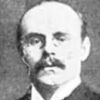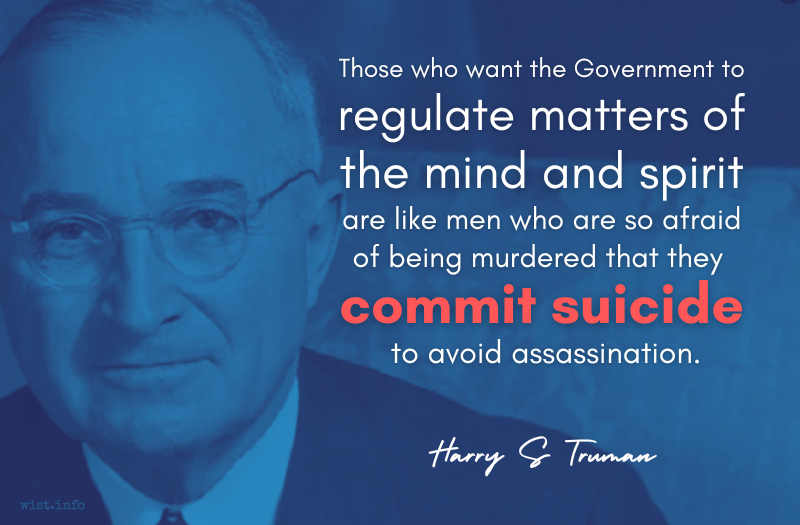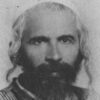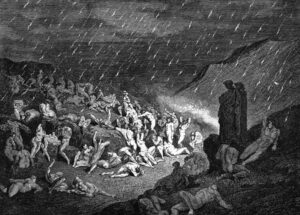GHOST, n. The outward and visible sign of an inward fear.
Ambrose Bierce (1842-1914?) American writer and journalist
“Ghost,” The Cynic’s Word Book (1906)
(Source)
A play on the traditional Christian (from St Augustine) definition of sacrament: "an outward and visible sign of inward and spiritual grace."
Included in The Devil's Dictionary (1911). Originally published in the "Devil's Dictionary" column in the San Francisco Wasp (1885-02-28).
Quotations about:
fear
Note not all quotations have been tagged, so Search may find additional quotes on this topic.
Better pass a Danger once, than be always in Fear.
Thomas Fuller (1654-1734) English physician, preacher, aphorist, writer
Introductio ad Prudentiam, Vol. 1, # 114 (1725)
(Source)
Fear makes evry thing and evry body masters over us; it iz the wust slavery thare iz.
[Fear makes everything and everybody masters over us; it is the worst slavery there is.]
Josh Billings (1818-1885) American humorist, aphorist [pseud. of Henry Wheeler Shaw]
Everybody’s Friend, Or; Josh Billing’s Encyclopedia and Proverbial Philosophy of Wit and Humor, ch. 148 “Affurisms: Ink Brats” (1874)
(Source)
We lavish on animals the love we are afraid to show to people. People might not return it; or worse, they might.
Mignon McLaughlin (1913-1983) American journalist and author
The Neurotic’s Notebook, ch. 1 (1963)
(Source)
No one is more susceptible to an experts fearmongering than a parent. Fear is in fact a major component of the act of parenting. A parent, after all, is the steward of another creature’s life, a creature who in the beginning is more helpless than the newborn of nearly any other species. This leads a lot of parents to spend a lot of their parenting energy simply being scared.
Steven Levitt (b. 1967) American economist and author
Freakonomics, ch. 5 “What Makes A Perfect Parent?” (2005) [with Stephen Dubner]
(Source)
Fear comes from uncertainty. When we are absolutely certain, whether of our worth or worthlessness, we are almost impervious to fear. Thus a feeling of utter unworthiness can be a source of courage.
Eric Hoffer (1902-1983) American writer, philosopher, longshoreman
The Passionate State of Mind, Aphorism 87 (1955)
(Source)
It is better to die well than to live ill. […] He who fears death loses the joy of life. Above all else truth triumphs. He conquers who dies because no adversity can hurt the one over whom iniquity holds not sway.
[Melius est bene mori, quam male vivere […] Qui mortem metuit, amittit gaudia vitae; super omnia vincit veritas, vincit, qui occiditur, quia nulla ei nocet adversitas, si nulla ei dominatur iniquitas.]
Jan Hus (c. 1370-1415) Czech priest, theologian, philosopher, Church reformer [John Huss, etc.]
Letter to Christian of Prachaticz (>1413-04) [tr. Schaff (1915)]
(Source)
Written while in exile from Prague. "Truth triumphs" was adopted as a motto by Hussite fighters, and is inscribed (in Czech, "Pravda vítězí") the banner of the President of the Czechia.
(Source (Latin)). Alternate translation:
It is better to die well than to live badly. [...] He that fears death, loses the joys of life. Above all else, truth is conqueror. He conquers, who is slain: for no adversity hurts him if no iniquity hath dominion over him.
[tr. Pope (1904)]
The following translation is often mis-cited to Schaff; an examination of Schaff's book shows the above translation instead. I cannot find an original for this translation.
It is better to die well, than to live wrongly [...] Who is afraid of death loses the joy of life; truth prevails all, prevails who is killed, because no adversity can harm him, who is not dominated by injustice.
The neurotic feels as though trapped in a gas-filled room where at any moment someone, probably himself, will strike a match.
Mignon McLaughlin (1913-1983) American journalist and author
The Second Neurotic’s Notebook, ch. 4 (1966)
(Source)
He was not a strong-minded man; but he had one quality which is almost as valuable a safeguard against temptation as strength of mind — namely, timidity.
F. Anstey (1856-1934) English novelist and journalist (pseud. of Thomas Anstey Guthrie)
Tourmalin’s Time Cheques, Prologue (1885)
(Source)
Piglet took Pooh’s arm, in case Pooh was frightened.
A. A. Milne (1882-1956) English poet and playwright [Alan Alexander Milne]
House at Pooh Corner, ch. 4 “Tiggers Don’t Climb Trees” (1928)
(Source)
But if you have a fear of unpopularity, is that arising from the imputation of vigour and boldness, or that arising from that of inactivity and indecision most to be feared? When Italy is laid waste by war, when cities are attacked and houses in flames, do you not think that you will be then consumed by a perfect conflagration of hatred?
[Sed si quis est invidiae metus, non1 est vehementius severitatis ac fortitudinis invidia quam inertiae ac nequitiae pertimescenda. An, cum bello vastabitur Italia, vexabuntur urbes, tecta ardebunt, tum te non existimas invidiae incendio conflagraturum]
Marcus Tullius Cicero (106-43 BC) Roman orator, statesman, philosopher
Orationes in Catilinam [Catilinarian Orations], No. 1, § 11, cl. 29 (1.11.29) (63-11-08 BC) [tr. Yonge (1856)]
(Source)
Speaking (aloud, rhetorically) to himself about his concerns of public reaction to his acting so passionately against Cataline's conspiracy.
(Source (Latin)). Alternate translations:
But if there be any fear of Envy, is the Censure of Severity and Courage more greatly to be feared, than that of Baseness and Cowardise? Do you not think, when Italy shall be made desolate with War, the Cities plundered, the Houses a-fire, you shall then fall under a flagrant Envy?
[tr. Wase (1671)]
If fear is to operate, which do you think is most to be dreaded, reproach for cowardice, or censure for magnanimity? When Italy is laid waste; when her cities are taken by storm; when her temples and mansions are wrapt in flames; it is then your danger will begin; it is then that the clamours of mankind will be loud against you.
[tr. Sydney (1795)]
But if there is any fear of odium, whether should the odium resulting from severity and determinati0on be dreaded more violently than that of indolence and wickedness? Whether, when Italy shall be ravaged by war, when the cities shall be harassed, when roofs shall be burning, dost thou not think that thou then will burn with a conflagration of odium?
[tr. Mongan (1879)]
But if there is any fear of envy (displeasure), whether is the envy of severity and of fortitude to be feared more violently, than (that) of inactivity and of negligence? Whether, when Italy shall be devastated with war, cities shall be burned, roofs (houses) shall be on fire: dost thou think thyself not (to be) about to burn then with a conflagration of envy (unpopularity)?
[tr. Underwood (1885)]
But if there is any fear of ill will, is the ill will because of strictness and courage to be feared more strongly, than (that) because of inactivity and negligence? When Italy shall be devastated with war, cities shall be harassed, roofs [houses] shall burn: do you think (you) yourself will not (about to) be consumed then with a conflagration of ill will?
[tr. Dewey (1916)]
If the question of inviting disapproval arises at all, the unpopularity resulting from firmness and determination is no more to be dreaded than the opprobrium produced by culpable failure to act. For when Italy is to be ravaged by war, when cities are assaulted and houses gutted by fire, do you not see how utterly the flames of hatred will consume you then?
[tr. Grant (1960)]
But if there is any fear of hatred, it is not hatred of harshness and firmness requiring to be feared more violently than (hatred) of idleness and worthlessness. Or when Italy is laid waste to, the cities will be harassed, the buildings will burn, then do you not think that you will be consumed by burning hatred?
[IB Notes]
It is by going down into the abyss
that we recover the treasures of life.Where you stumble,
there lies your treasure.The very cave you are afraid to enter
turns out to be the source of
what you are looking for.
The damned thing in the cave
that was so dreaded
has become the center.Joseph Campbell (1904-1987) American writer, professor of literature
In Diane K. Osbon, ed., Reflections on the Art of Living: A Joseph Campbell Companion, “In the Field” (1991)
(Source)
Quoted extensively, and mis-cited to a variety of Campbell's published works. I have not been able to confirm a primary source for it.
A little embarrassment prevents a lot of goodness.
Mignon McLaughlin (1913-1983) American journalist and author
The Neurotic’s Notebook, ch. 8 (1963)
(Source)
We are women: in some things, we hesitate.
But in others, no one can surpass our courage.[γυναῖκές ἐσμεν: τὰ μὲν ὄκνῳ νικώμεθα,
τὰ δ᾽ οὐκ ἂν ἡμῶν θράσος ὑπερβάλοιτό τις.]Euripides (485?-406? BC) Greek tragic dramatist
Auge [Αὐγῃ], frag. 276 (c. 408 BC) [tr. @sentantiq (2014)]
(Source)
Nauck (TGF) frag. 276, Barnes frag. 18, Musgrave frag. 4. (Source (Greek)). Alternate translations:
Frail women as we are, too oft our fears
Subdue us, but at other times our courage
By none can be exceeded.
[tr. Wodhall (1809)]
We are women, sometimes defeated by fear,
sometimes unsurpassed in courage.
[Source]
CAMILLO:My gracious lord,
I may be negligent, foolish, and fearful.
In every one of these no man is free,
But that his negligence, his folly, fear,
Among the infinite doings of the world,
Sometime puts forth. In your affairs, my lord,
If ever I were willful-negligent,
It was my folly; if industriously
I played the fool, it was my negligence,
Not weighing well the end; if ever fearful
To do a thing where I the issue doubted,
Whereof the execution did cry out
Against the non-performance, ’twas a fear
Which oft infects the wisest. These, my lord,
Are such allowed infirmities that honesty
Is never free of.William Shakespeare (1564-1616) English dramatist and poet
Winter’s Tale, Act 1, sc. 2, l. 310ff (1.2.310-325) (1611)
(Source)
Are you happy now? Are you likely to remain so till this evening? or next week? or next month? or next year? Then why destroy present happiness by a distant misery, which may never come at all, or you may never live to see it? for ever substantial grief has twenty shadows, and most of them shadows of your own making.
Sydney Smith (1771-1845) English clergyman, essayist, wit
Memoir of the Reverend Sydney Smith, by His Daughter, Lady Holland, Vol. 1, ch. 11 (1855)
(Source)
Advice for fighting melancholy / depression / anxiety by "taking short views of life" and not borrowing trouble.
Every human being, like every animal, wants to live in what is felt to be a safe environment — an environment where you won’t be exposed to unexpected peril. Now, when a man tells you that something you’ve always believed was in fact not true, it gives you a frightful shock and you think, “Oh! I don’t know where I am. When I think I’m planting my foot upon the ground, perhaps I’m not.” And you get into a terror.
Bertrand Russell (1872-1970) English mathematician and philosopher
Interview by Woodrow Wyatt, BBC TV (1959)
On resistance to scientific discovery.
Collected in Bertrand Russell's BBC Interviews (1959) [UK] and Bertrand Russell Speaks His Mind (1960) [US]. Reprinted (abridged) in The Humanist (1982-11/12), and in Russell Society News, #37 (1983-02).
Distrust, and darkness, of a future state,
Make poor Mankind so fearful of their Fate.
Death, in itself, is nothing; but we fear
To be we know not what, we know not where.
The fear of being laughed at makes cowards of us all.
Mignon McLaughlin (1913-1983) American journalist and author
The Neurotic’s Notebook, ch. 10 (1963)
(Source)
Ambition is to the mind, what the cap is to the falcon; it blinds us first, and then compels us to tower, by reason of our blindness. But alas, when we are at the summit of a vain ambition, we are also at the depth of real misery. We are placed where time cannot improve, but must impair us; where chance and change cannot befriend, but may betray us; in short, by attaining all we wish, and gaining all we want, we have only reached a pinnacle, where we have nothing to hope, but every thing to fear.
Charles Caleb "C. C." Colton (1780-1832) English cleric, writer, aphorist
Lacon: Or, Many Things in Few Words, Vol. 1, § 37 (1820)
(Source)
There are some men who listen neither to reason nor to good advice, and who deliberately go astray through fear of being dominated.
[Il se trouve des hommes qui n’écoutent ni la raison ni les bons conseils, et qui s’égarent volontairement par la crainte qu’ils ont d’être gouvernés.]
Jean de La Bruyère (1645-1696) French essayist, moralist
The Characters [Les Caractères], ch. 4 “Of the Affections [Du Coeur],” § 71 (4.71) (1688) [tr. Stewart (1970)]
(Source)
(Source (French)). Alternate translations:
There are those men who will not hearken to reason, or good council, but deviate of their own Heads, purely for fear of being govern'd.
[Bullord ed. (1696)]
There are some Men who will not hearken to Reason and good Counsel, but deviate of their own Heads, purely for fear of being govern'd.
[Curll ed. (1713)]
There are some Men who turn the deaf Ear to Reason and friendly Counsel, and play the Fool of their own Heads, purely for fear of being governed.
[Browne ed. (1752)]
There are some men who turn a deaf ear to reason and good advice, and willfully go wrong for fear of being controlled.
[tr. Van Laun (1885)]
Men will readily enough avow cruelty, passion, even avarice, but never cowardice, because such an admission would bring them, among savages and even in civilized society, into mortal danger.
[Les hommes avouent volontiers la cruauté, la colère, l’avarice même, mais jamais la lâcheté, parce que cet aveu les mettrait, chez les sauvages et même dans une société polie, en un danger mortel.]
Anatole France (1844-1924) French poet, journalist, novelist, Nobel Laureate [pseud. of Jaques-Anatole-François Thibault]
The Gods Will Have Blood [Les Dieux Ont Soif], ch. 19 [Brotteaux] (1912) [tr. Allinson (1913), The Gods Are Athirst]
(Source)
(Source (French)). Alternate translation:
Men willingly post of their cruelty, their anger, their greed even, but never of their cowardice, because to admit such a thing would put them, whether in a primitive or a civilized society, in mortal peril.
[tr. Davies (1979)]
Cynical is the name we give those we fear may be laughing at us.
Stephen Fry (b. 1957) British actor, writer, comedian
The Hippopotamus, ch. 4, sec. 3 [Ted] (2014)
(Source)
A neurotic is someone who’s afraid to see himself as he’s afraid others see him.
Mignon McLaughlin (1913-1983) American journalist and author
The Second Neurotic’s Notebook, ch. 10 (1966)
(Source)
Dark stratagems, and treachery, to relieve
The coward’s wants, were by mankind devis’d.[δόλοι δὲ καὶ σκοτεινὰ μηχανήματα
χρείας ἀνάνδρου φάρμαχ᾽ εὕρηται βροτοῖς.]Euripides (485?-406? BC) Greek tragic dramatist
Bellerophon [Βελλεροφῶν], frag. 288 (TGF) (c. 430 BC) [tr. Wodhull (1809)]
(Source)
Nauck frag. 290, Barnes frag. 42, Musgrave frag. 8. (Source (Greek)). Alternate translations:
Tricks and dark schemes are mankind's invention as
cowardly remedies against need.
[tr. Collard, Hargreaves, Cropp (1995)]
Trickery and devious devices are man’s unmanly means to meet his needs.
[tr. Stevens (2012)]
Blessed is he who has succeeded in learning the laws of nature’s working, has cast beneath his feet all fear and fate’s implacable decree, and the howl of insatiable Death.
[Felix, qui potuit rerum cognoscere causas,
atque metus omnis et inexorabile fatum
subiecit pedibus strepitumque Acherontis avari.]Virgil (70-19 BC) Roman poet [b. Publius Vergilius Maro; also Vergil]
Georgics [Georgica], Book 2, l. 490ff (2.490-492) (29 BC) [tr. Fairclough (Loeb) (1916)]
(Source)
(Source (Latin)). Alternate translations:
Happie is he that hidden causes knowes,
And bold all shapes of danger dares oppose:
Trampling beneath his feet the cruell Fates,
Whom Death, nor swallowing Acheron amates.
[tr. Ogilby (1649)]
Happy the Man, who, studying Nature's Laws,
Thro' known Effects can trace the secret Cause.
His Mind possessing, in a quiet state,
Fearless of Fortune, and resign'd to Fate.
[tr. Dryden (1709), l. 698-701]
Happy the Man, whose penetrating mind
Of things the latent causes first could find,
He, who all terrors, ruthless Fate could quell,
And the dire din of all-devouring Hell!
[tr. Nevile (1767), l. 549-552]
How blest the sage! whose soul can pierce each cause
Of changeful Nature, and her wondrous laws:
Who tramples fear beneath his foot, and braves
Fate, and stern death, and hell's resounding waves.
[tr. Sotheby (1800)]
Happy is he who has been able to trace out the causes of things, and who has cast beneath his feet all fears, and inexorable Destiny, and the noise of devouring Acheron!
[tr. Davidson (1854)]
Thrice blest the man whom mighty genius brings
To know the cause and origin of things:
Beneath his feet lie destiny and dread;
He walks the roaring waters of the dead.
[tr. Blackmore (1871)]
Happy the man who has won the knowledge of the moving springs of nature, and so trmapled under food all fears, and the remorseless doom of death, and the road of Acheron, yawning for prey!
[tr. Wilkins (1873)]
Happy, who had the skill to understand
Nature's hid causes, and beneath his feet
All terrors cast, and death's relentless doom,
And the loud roar of greedy Acheron.
[tr. Rhoades (1881)]
Happy the man who knows the secret cause,
How nature works, and reads creation’s laws,
Whose soul to fortune can superior rise,
And death, dark minister of fate, despise.
[tr. King (1882), ll. 498-501]
Happy is he who has been able to trace out the causes of things, and who has trodden under foot all idle fears, and inexorable Destiny, and the roar of devouring Acheron!
[tr. Bryce (1897)]
Happy he who hath availed to know the causes of things, and hath laid all fears and immitigable Fate and the roar of hungry Acheron under his feet.
[tr. Mackail (1899)]
Oh happy, whose heart hath attained Creation's secret to know,
Who hath trampled all haunting fears underfoot, nor dreadeth the blow
Of Fate the relentless, the roar of insatiate Acheron's flow!
[tr. Way (1912)]
Blest was that man whose vision could explore
The world's prime causes, conquering for man
His horde of fears, his certain doom of death
Inexorable, and the menace loud
Of hungry Acheron!
[tr. Williams (1915)]
Lucky is he who can learn the roots of the universe,
Has mastered all his fears and fate's intransigence
And the hungry clamour of hell.
[tr. Day-Lewis (1940)]
Blessed is he who masters nature’s laws,
Tramples on fear and unrelenting fate,
On greedy, roaring Acheron.
[tr. Bovie (1956)]
Happy the man who has been able to learn the causes of things and has trampled beneath his feet all fears, inexorable fate, and the howl of greedy Acheron.
[tr. Miles (1980)]
Blessed is he whose mind had power to probe
The causes of things and trample underfoot
All terrors and inexorable fate
And the clamour of devouring Acheron.
[tr. Wilkinson (1982)]
He who’s been able to learn the causes of things is happy,
and has set all fear, and unrelenting fate, and the noise
of greedy Acheron, under his feet.
[tr. Kline (2001)]
Blessed, he who understands the workings of nature
and tramples all fear and relentless fate and the bone-
shaking clatter of greedy Death beneath his feet.
[tr. Lembke (2004)]
O happy he who can fathom the causes of thing,
who's thrown all fear and dogged Fate
beneath his feet, and the roaring of ravenous Acheron.
[tr. Johnson (2009)]
That man is blessed who has learned the causes of things,
And therefore under his feet subjugates fear
And the decrees of unrelenting fate
And the noise of Acheron's insatiable waters.
[tr. Ferry (2015)]
Conscience makes cowards of us all. Politeness is even worse. It makes actors of us.
H. L. Mencken (1880-1956) American writer and journalist [Henry Lewis Mencken]
A Little Book in C Major, ch. 2, § 26 (1916)
(Source)
Not reprinted in later works.
Trouble, like the hill ahead, straightens out when you advance upon it.
Marcelene Cox (1900-1998) American writer, columnist, aphorist
“Ask Any Woman” column, Ladies’ Home Journal (1953-05)
(Source)
Do not ask, Reader, how my blood ran cold
and my voice choked up with fear. I cannot write it:
this is a terror that cannot be told.
I did not die, and yet I lost life’s breath:
imagine for yourself what I became,
deprived at once of both my life and death.[Com’io divenni allor gelato e fioco,
nol dimandar, lettor, ch’i’ non lo scrivo,
però ch’ogne parlar sarebbe poco.
Io non mori’ e non rimasi vivo;
pensa oggimai per te, s’ hai fior d’ingegno,
qual io divenni, d’uno e d’altro privo.]Dante Alighieri (1265-1321) Italian poet
The Divine Comedy [Divina Commedia], Book 1 “Inferno,” Canto 34, l. 22ff (34.22-27) (1309) [tr. Ciardi (1954)]
(Source)
Dante the Pilgrim finally sees Satan at the bottom and center of Hell. That would seem to be terrifying enough for this aside to the reader, but various translators and commentators try to cast it as some great theological metaphor.
(Source (Italian)). Alternate translations:
How frozen I was then, and hoarse with cold,
Reader, ask not; for I nought of it write,
As 'twill too little prove, whate'er I say
I did not die, nor yet alive remain'd.
Think for yourself, if you have any sense,
What I then was, depriv'd of Life and Death.
[tr. Rogers (1782)]
While nature thro' my nerves convulsive shook:
New palsies seiz'd my agonizing frame,
And glowing now I felt the fever's flame.
While life and death by turns my limbs forsook.
[tr. Boyd (1802), st. 6]
How frozen and how faint I then became,
Ask me not, reader! for I write it not,
Since words would fail to tell thee of my state.
I was not dead nor living. Think thyself
If quick conception work in thee at all,
How I did feel.
[tr. Cary (1814)]
Ask me not, reader, how both hoarse and cold
I then became; I write it not, nor strive
To tell what never might by speech be told.
There I nor died, nor yet remained alive:
Now think, if thou hast power of thought, and see
What state was mine, that could of both deprive.
[tr. Dayman (1843)]
How icy chill and hoarse I then became, ask not, O Reader! for I write it not, because all speech would fail to tell.
I did not die, and did not remain alive: now think for thyself, if thou hast an grain of ingenuity, what I became, deprived of both death and life.
[tr. Carlyle (1849)]
How freezing then, how feeble I became,
Ask not, thou reader! for I cannot write;
For every language must fall short in flight.
I neither died, nor yet remained alive!
Think within thyself, if ingenious deft,
How I became of strength and heat bereft.
[tr. Bannerman (1850)]
How terror-frozen I became and faint,
Ask not, oh reader, what I cannot write,
For all that I could say would feeble seem.
I did not die, I scarcely was alive;
Hast thou one spark of fancy, think thou then
How I became who knew nor death nor life.
[tr. Johnston (1867)]
How frozen I became and powerless then,
Ask it not, Reader, for I write it not,
Because all language would be insufficient.
I did not die, and I alive remained not;
Think for thyself now, hast thou aught of wit,
What I became, being of both deprived.
[tr. Longfellow (1867)]
How I then became frozen and weak, do not ask, reader, for I do not write it, seeing that every speech would be too little. I did not die and did not remain alive; think now for thyself, if thou hast a grain of wit, what I became, being deprived of one and the other.
[tr. Butler (1885)]
How frozen I became, and weak of grace,
From writing, reader, let me now be shrived,
For every speech were weak such state to trace.
I did not die, and yet no longer lived;
Think for thyself, if thou hast Fancy's bloom,
What I became, of death and life deprived.
[tr. Minchin (1885)]
How I became then chilled and hoarse, ask it not, Reader, for I write it not, because all speech would be little. I did not die, and I did not remain alive. Think now for thyself, if thou hast grain of wit, what I became, deprived of one and the other.
[tr. Norton (1892)]
How frozen I became thereat, how fainting,
Ask it not, reader, for I do not write it.
For all that I could say would be but little.
I did not die, nor yet remained I living.
Bethink thee now, if aught of wit thou claimest,
What I became, bereft of both together.
[tr. Griffith (1908)]
How chilled and faint I turned then, do not ask, reader, for I do not write it, since all words would fail. I did not die and I did not remain alive; think now for thyself, if thou hast any wit, what I became, denied both death and life.
[tr. Sinclair (1939)]
How faint I then became, how frozen cold,
Ask me not, Reader; for I write it not,
Because all speech would fail, whate'er it told.
I died not, yet of life remained no jot.
Think thou then, if of wit thou hast any share,
What I became, deprived of either lot.
[tr. Binyon (1943)]
How cold I grew, how faint with fearfulness,
Ask me not. Reader; I shall nor waste breath
Telling what words are powerless to express;
This was not life, and yet it was not death;
If thou hast wit to think how I might fare
Bereft of both, let fancy aid thy faith.
[tr. Sayers (1949)]
How frozen and faint I then became, ask it not, reader, for I do not write it, because all words would fail. I did not die and I did not remain alive: now think for yourself, if you have any wit, what I became, deprived alike of death and life!
[tr. Singleton (1970)]
How chilled and nerveless. Reader, I felt then;
do not ask me -- I cannot write about it --
there are no words to tell you how I felt.
I did not die -- I was not living either!
Try to imagine, if you can imagine,
me there, deprived of life and death at once.
[tr. Musa (1971)]
O reader, do not ask of me how I
grew faint and frozen then -- I cannot write it:
all words would fall far short of what it was.
I did not die, and I was not alive; v think for yourself, if you have any wit,
what I became, deprived of life and death.
[tr. Mandelbaum (1980)]
How frozen and how faint I then became,
Do not enquire, reader, description is useless,
For any speech would be inadequate.
I did not die, nor yet remain alive:
Think for yourself, if you have a trace
Of intellect, how I was, in that condition.
[tr. Sisson (1981)]
How chilled and faint I was
On hearing that, you must not ask me, reader --
I do not write it, words would not suffice:
I neither died, nor kept alive -- consider
With your own wits what I, alike denuded
Of death and life, became as I heard my leader.
[tr. Pinsky (1994)]
How then I became frozen and feeble, do not ask, reader, for I do not write it, and all speech would be insufficient.
I did not die and I did not remain alive: think now for yourself, if you have wit at all, what I became, deprived of both.
[tr. Durling (1996)]
Reader, do not ask how chilled and hoarse I became, then, since I do not write it, since all words would fail to tell it. I did not die, yet I was not alive. Think, yourself, now, if you have any grain of imagination, what I became, deprived of either state.
[tr. Kline (2002)]
How weak I now became, how faded, dry --
reader, don’t ask, I shall not write it down --
for anything I said would fall far short.
I neither died nor wholly stayed alive.
Just think yourselves, if your minds are in flower,
what I became, bereft of life and death.
[tr. Kirkpatrick (2006)]
Then how faint and frozen I became,
reader, do not ask, for I do not write it,
since any words would fail to be enough.
It was not death, nor could one call it life.
Imagine, if you have the wit,
what I became, deprived of either state.
[tr. Hollander/Hollander (2007)]
Don't ask me, reader, how frozen and faint I felt:
I cannot write it, because no matter what words
I used, or how many, none would be sufficient.
I did not die, I did not remain in that world.
Just ask yourself, if you have a mind to work with,
In what condition I was, not dead, not alive?
[tr. Raffel (2010)]
Reader, don’t ask how chill and faint I turned:
I couldn't write it. All the words would fail.
I didn't die, but couldn't live. I learned
What living death and death-in-life entail.
But you must ponder, if you have the wit,
What I, denied both life and death, became.
[tr. James (2013), l. 28ff]
Those who want the Government to regulate matters of the mind and spirit are like men who are so afraid of being murdered that they commit suicide to avoid assassination.
If one burdens the future with one’s worries, it cannot grow organically. I am filled with confidence, not that I shall succeed in worldly things, but that even when things go badly for me I shall still find life good and worth living.
Esther "Etty" Hillesum (1914-1943) Dutch Jewish law graduate, writer, diarist
Diary (1942-06-11)
(Source)
Collected in An Interrupted Life [Het Verstoorde Leven] (1981) [tr. Pomerans (1983)].
Laughter is poison to fear.
George R. R. Martin (b. 1948) American author and screenwriter [George Raymond Richard Martin]
A Game of Thrones, “Catelyn” 8 [Catelyn Stark] (1996)
(Source)
All the world is a very narrow bridge, and the most important thing is not to be overwhelmed by fear.
כל העולם כולו גשר צר מאוד, והעיקר – לא לפחד כלל.
Nachman of Breslov (1772-1810) Ukrainian Jewish Hasidic leader, rabbi, kabbalist [רַבִּי נַחְמָן מִבְּרֶסְלֶב; of Bratslav; of Bracław]
(Paraphrase)
The original of this passage, in Nachman's Likutey Moharan, Part 2, 48:2, is:
[וְדַע, שֶׁהָאָדָם צָרִיך לַעֲבר עַל גֶּשֶׁר צַר מְאֹד מְאֹד וְהַכְּלָל וְהָעִקָּר שֶׁלּא יִתְפַּחֵד כְּלָל]
which is variously translated:
And know, a person needs to make his passage on a very, very narrow bridge, and the rule and the essence is to not be afraid at all.
[Source]
Know that [when] a person needs to cross a very, very narrow bridge, the general principle and main point is not to make oneself at all terrified.
[Source]
Now know, a person needs to pass over on a very, very narrow bridge, and the rule and the essence is to not be afraid at all.
[Source]
This Nachman quote was paraphrased and set to music in the Hebrew tune, "Kol Ha'Olam Kulo [כָּל הָעוֹלָם כֻּלוֹ]":
Kol ha'olam kulo
Gesher tzar me'od,
Veha'ikar lo le'fached klal.
Other translations of the song include:
More information about the song:
- "All the world is a very narrow bridge, and the essence is not to fear at all."
- "All the world is a very narrow bridge, and the essence is, don't be afraid at all."
- "The whole world is a narrow bridge, but the main thing is not to be at all afraid."
- "All the world is a very narrow bridge. / But the main thing to recall / Is to have no fear at all."
But the best state for human nature is that in which, while no one is poor, no one desires to be richer, nor has any reason to fear being thrust back, by the efforts of others to push themselves forward.
John Stuart Mill (1806-1873) English philosopher and economist
Principles of Political Economy, Book 4, ch. 6 (1871)
(Source)
The only basis for fearing the votes of men is to fear those men themselves. To deny the right to vote is to increase those fears.
Lyndon B. Johnson (1908-1973) American politician, educator, US President (1963-69)
Speech (1960-03-10), U.S. Senate
(Source)
As Senate Majority Leader.
A statesman is a man that can do what the politician would like to do but can’t, because he is afraid of not being elected.
O endless wrath of God: how utterly
thou shouldst become a terror to all men
who read the frightful truths revealed to me![O vendetta di Dio, quanto tu dei
esser temuta da ciascun che legge
ciò che fu manifesto a li occhi mei!]Dante Alighieri (1265-1321) Italian poet
The Divine Comedy [Divina Commedia], Book 1 “Inferno,” Canto 14, l. 16ff (14.16-18) (1309) [tr. Ciardi (1954), l. 13ff]
(Source)
On entering the Seventh Circle, third ring, and seeing flames drifting down from the sky, landing on the damned trapped there (blasphemers, sodomites, usurers).
(Source (Italian)). Alternate translations:
O Vengeance dire of God, how much you should
By ev'ry one be dreaded, when he reads
What to my eyes was manifestly shewn!
[tr. Rogers (1782)]
Vengeance of Heav'n! I saw thy hand severe
(Your doom! ye Atheists and Blasphemers, hear!)
O'er many a naked soul the scourge display!
[tr. Boyd (1802), st. 4]
Vengeance of Heav’n! Oh! how shouldst thou be fear’d
By all, who read what here my eyes beheld!
[tr. Cary (1814)]
O vengeance of the Eternal! how ought they
Who read the tale, thy workings mark with awe,
In that my troubled eyes did here survey!
[tr. Dayman (1843)]
O vengeance of God! how shouldst thou be feared by every one who reads what was revealed to my eyes!
[tr. Carlyle (1849)]
Avenging power of God! how should each fear,
Who reads of this, arresting with surprise,
The sight which manfestly met mine eyes!
[tr. Bannerman (1850)]
Oh, God's great vengeance! with what heavy dread
Thou should'st be fear'd by ev'ry one who reads
What to mine eyes so manifest was made!
[tr. Johnston (1867), l. 16ff]
Vengeance of God, O how much oughtest thou
By each one to be dreaded, who doth read
That which was manifest unto mine eyes!
[tr. Longfellow (1867)]
O vengeance of God, how oughtest thou to be feared by each one who reads that which was manifested to my eyes!
[tr. Butler (1885)]
O vengeance of great God! with what a fear
Thou shouldst be held by all who read in awe
That which before my eyes was visibly clear!
[tr. Minchin (1885)]
O vengeance of God, how much thou oughtest to be feared by every one who readeth that which was manifest unto mine eyes!
[tr. Norton (1892)]
O Vengeance of God, how mightily shouldst thou be feared by all who read that which was given mine eyes to look upon!
[tr. Sullivan (1893)]
Vengeance of God! In what great fear and trembling
Should'st thou be held by each who reads the story
Of that which to my eyes was manifested.
[tr. Griffith (1908)]
O vengeance of God, how must thou be feared by everyone who reads what was plain before my eyes!
[tr. Sinclair (1939)]
O chastisement of God, how oughtest thou
To be of each one feared who reads with awe
What to my eyes was manifested now.
[tr. Binyon (1943)]
Fearful indeed art thou, vengeance of God!
He that now reads what mine own eyes with awe
Plainly beheld, well may he dread thy rod!
[tr. Sayers (1949)]
O vengeance of God, how much should you be feared by all who read what was revealed to my eyes!
[tr. Singleton (1970)]
O just revenge of God! how awesomely
you should be feared by everyone who reads
these truths that were revealed to my own eyes!
[tr. Musa (1971)]
O vengeance of the Lord, how you should be
dreaded by everyone who now can read
whatever was made manifest to me!
[tr. Mandelbaum (1980)]
O vengeance of God, how much you ought
To be feared by everyone who reads
What was there manifested to my eyes.
[tr. Sisson (1981)]
O vengeance of God, how much
Should you be feared by all of those who read
What my eyes saw!
[tr. Pinsky (1994)]
O vengeance of God, how much must you be feared by everyone who reads what was made manifest to my eyes!
[tr. Durling (1996)]
O God’s vengeance, how what was shown to my sight should be feared, by all who read!
[tr. Kline (2002)]
Great God! Your vengeance must be rightly feared
by all who read the verses I compose
to say what there was straight before my eyes.
[tr. Kirkpatrick (2006)]
O vengeance of God, how much
should you be feared by all who read
what now I saw revealed before my eyes!
[tr. Hollander/Hollander (2007)]
But O God's awful vengeance! Reading this,
You all should tremble with fear for what my eyes
Were shown, dark and terrible, a burning brilliance!
[tr. Raffel (2010)]
Holy Vengeance, how you must
Be feared by all who read what now I saw!
[tr. James (2013)]
But although tact is a virtue, it is very closely allied to certain vices; the line between tact and hypocrisy is a very narrow one. I think the distinction comes in the motive: when it is kindliness that makes us wish to please, our tact is the right sort; when it is fear of offending, or desire to obtain some advantage by flattery, our tact is apt to be of a less amiable kind.
Bertrand Russell (1872-1970) English mathematician and philosopher
“On Tact,” New York American (1933-02-01)
(Source)
There are three things all wise men fear: the sea in storm, a night with no moon, and the anger of a gentle man.
Patrick Rothfuss (b. 1973) American author
The Name of the Wind, ch. 43 “The Flickering Way” (2007)
(Source)
Fear tends to come from ignorance. Once I knew what the problem was, it was just a problem, nothing to fear.
Patrick Rothfuss (b. 1973) American author
The Name of the Wind, ch. 32 “Coppers, Cobblers and Crowds” (2007)
(Source)
But the greatest undertakings should not be overly pondered, lest contemplation of difficulties too clearly foreseen appall you.
[Los grandes empeños aun no se han de pensar, basta ofrecerse, porque la dificultad, advertida, no ocasione el reparo.]
Baltasar Gracián y Morales (1601-1658) Spanish Jesuit priest, writer, philosopher
The Art of Worldly Wisdom [Oráculo Manual y Arte de Prudencia], § 204 (1647) [tr. Fischer (1937)]
(Source)
(Source (Spanish)). Alternate translations:
As to great enterprizes, we must not stand reasoning, it is enough that we embrace them when they present, lest the consideration of their difficulty make us abandon the attempt.
[Flesher ed. (1685)]
Great undertakings are not to be brooded over, lest their difficulty when seen causes despair.
[tr. Jacobs (1892)]
In moments of great danger, don't even think, simply act. Don't dwell on the difficulties.
[tr. Maurer (1992)]
It feels cooler to say, “I’m not woke,” than the truth, which is, “I’m terrified of what I don’t understand and I only know how to process that as anger because I can’t look inward.”
Sarah Silverman (b. 1970) American stand-up comedian, actress, writer
The Daily Show (15 Feb 2023)
(Source)
It is written that the last enemy to be vanquished is death. We should begin early in life to vanquish this enemy by obliterating every trace of the fear of death from our minds. Then can we turn to life and fill the whole horizon of our souls with it, turn with added zest to all the serious tasks which it imposes and to the pure delights which here and there it affords.
Felix Adler (1851-1933) German-American educator
Life and Destiny, Lecture 8 “Suffering and Consolation” (1903)
(Source)
The Fear of Death often proves Mortal, and sets People on Methods to save their Lives, which infallibly destroy them.
Joseph Addison (1672-1719) English essayist, poet, statesman
The Spectator, # 25 (29 Mar 1711)
(Source)
PERICLES: I knew him tyrannous, and tyrants’ fears
Decrease not but grow faster than the years.William Shakespeare (1564-1616) English dramatist and poet
Pericles, Act 1, sc. 2, l. 91ff (1.2.91-92) (1607) [with George Wilkins]
(Source)
So this is the difference between telling a story and being in one, he thought numbly, the fear.
Patrick Rothfuss (b. 1973) American author
The Name of the Wind, ch. 6 “The Price of Remembering (2007)
(Source)
Not living in fear is a great gift, because certainly these days we do it so much. And do you know what I like about comedy? You can’t laugh and be afraid at the same time — of anything. If you’re laughing, I defy you to be afraid.
It is impossible that anything so natural, so necessary, and so universal as death should ever have been designed by Providence as an evil to mankind.
Ignorance is always afraid of change. It fears the unknown and sticks to its rut, however miserable it may be there. In its blindness it stumbles on anyhow.
Jawaharlal Nehru (1889-1964) Indian nationalist leader, politician, statesman, author
Glimpses of World History, Letter 82, 4 Aug 1932 (1934)
(Source)
But what is all this fear of and opposition to Oblivion? What is the matter with the soft Darkness, the Dreamless Sleep?
James Thurber (1894-1961) American cartoonist and writer
In Clifton Fadiman, I Believe: The Personal Philosophies of Twenty-Three Eminent Men and Women of Our Time (1940)
(Source)
Also published in Forum and Century (Jun 1939). Words spoken by Sylvester Blougram, the title character from Robert Browning's "Bishop Blougram's Apology" (1855).
“If rightly I read the trouble in thy breast,”
The shade of the Magnanimous replied,
“With cowardice thy spirit is oppressed,
Which oftentimes a man hath mortified,
So that it turns him back from noble deed,
As with false seeing a beast will start aside.”[“S’i’ ho ben la parola tua intesa”,
rispuose del magnanimo quell’ombra,
“l’anima tua è da viltade offesa;
la qual molte fïate l’omo ingombra
sì che d’onrata impresa lo rivolve,
come falso veder bestia quand’ombra.”]Dante Alighieri (1265-1321) Italian poet
The Divine Comedy [Divina Commedia], Book 1 “Inferno,” Canto 2, l. 43ff (2.43-48) [Virgil] (1309) [tr. Binyon (1943)]
(Source)
(Source (Italian)). Alternate translations:
If I your words have rightly understood,
Replied the Shade magnanimous, your Mind
Is stagger'd with distrust, which oft perverts
A good design with honour first begun:
As frequently the shadow of a beast
Appears more horrid than the form itself.
[tr. Rogers (1782), ll. 39-44]
"Speak'st thou thy thought!" the dauntless shade replies;
"Dishonour'd ever be that soul unwise,
That takes to counsel cold suggesting fear!
Unmanly fear, that chains the lib'ral mind,
And fills with dreadful chapes the puffing wind; --
But thou resolve, and scorn to linger here!
[tr. Boyd (1802), st. 9]
"If right thy words
I scan," replied that shade magnanimous,
"Thy soul is by vile fear assail'd, which oft
So overcasts a man, that he recoils
From noblest resolution, like a beast
At some false semblance in the twilight gloom."
[tr. Cary (1814)]
"If of thy words I rightly read the scope,
Thy stumbling soul," replied that hero-ghost,
"With its own cowardice is loth to cope.
Man oftentime she, cumbering to his cost,
Turns recreant from each generous aim away.
Like startled beast by mocking shadow crost."
[tr. Dayman (1843)]
"If I have rightly understood thy words," replied that shade of the Magnanimous, "thy soul is smit with coward fear,
which oftentimes encumbers men, so that it turns them back from honoured enterprise; as false seeing does a startled beast."
[tr. Carlyle (1849)]
"If well I understand your speech," replied
The shade of the Magnanimous, "your soul,
Hurt with vile cowardice, is in the toil
The which our nature often will embroil --
From honoured enterprise the mind recall,
Like a false bugbear, when the shadows fall."
[tr. Bannerman (1850)]
"If I thy words have rightly understood,"
Then answer'd me that shade magnanimous, --
"Thy spirit is by cowardice unstrung,
By which man oft is hinder'd and beset,
So that he turns away from honour's call,
As a beast starts, by vision false deceiv'd.
[tr. Johnston (1867)]
"If I have well thy language understood,"
Replied that shade of the Magnanimous,
"Thy soul attainted is with cowardice,
Which many times a man encumbers so,
It turns him back from honored enterprise,
As false sight doth a beast, when he is shy.
[tr. Longfellow (1867)]
‘If I have well understood thy word,’ replied that shade of the high-souled one, ‘thy soul is hindered by cowardice, which oftentimes so encumbers the man that it turns him back from honourable enterprise, as wrong-seeing does a beast when it shies.’
[tr. Butler (1885)]
"If thy words' meaning clearly I devise,"
Answered the shadow of that noble bard,
"Thy spirit of its vileness feels the poise,
Which many a time and oft will man retard,
So that the honoured enterprise they leave,
As beasts in darkness falsely things regard.
[tr. Minchin (1885)]
“If I have rightly understood thy speech,” replied that shade of the magnanimous one, “thy soul is hurt by cowardice, which oftentimes encumbereth a man so that it turns him back from honorable enterprise, as false seeing does a beast when it is startled."
[tr. Norton (1892)]
"If I have rightly understood thy speech," answered the shade of him of mighty mind, "thy spirit is assailed by cowardice, which oftentimes perplexeth man, so that it turneth him away from honoured enterprise, even as uncertain sight turneth a beast when it is growing dark."
[tr. Sullivan (1893)]
"If of thy words I have right understanding,"
That shade of the magnanimous made answer,
"Thy soul by cowardice is overpowered,
Which oftentimes doth so a man encumber
That back from honest enterprise it turns him,
As false sight doth a beast, when shades are falling.
" [tr. Griffith (1908)]
"If I have rightly understood thy words," replied the shade of that great soul, "thy spirt is smitten with cowardice, which many a time encumbers a man so that it turns him back from honourable enterprise, as a mistaken sight a shying beast."
[tr. Sinclair (1939)]
"If I have grasped what thou dost seem to say,"
The shade of greatness answered, "these doubts breed
From sheer black cowardice, which day by day
Lays ambushes for men, checking the speed
Of honourable purpose in mid-flight,
As shapes half-seen startle a shying steed."
[tr. Sayers (1949)]
"I understand your words, and the look in your eyes,"
that shadow of magnificence answered me,
"your soul is shrunk in that cowardice
that bears down many men, turning their course
and resolution by imagined perils,
as his own shadow turns the frightened horse."
[tr. Ciardi (1954)]
"If I have well understood what you say," the shade of that magnanimous one replied, "your spirit is beset by cowardice, which oftentimes encumbers a man, turning him from honorable endeavor, as false seeing turns a beast that shies."
[tr. Singleton (1970)]
"If I have truly understood your words,"
that shade of magnanimity replied,
"your soul is burdened with that cowardice
which often weighs so heavily on man
it turns him from a noble enterprise
like a frightened beast that shies at its own shadow."
[tr. Musa (1971)]
"If I have understood what you have said,"
replied the shade of that great-hearted one,
"your soul has been assailed by cowardice,
which often weighs so heavily on a man --
distracting him from honorable trials --
as phantoms frighten beasts when shadows fall."
[tr. Mandelbaum (1980)]
"If I have understood what you have said,"
The reply came from that shadow of generosity,
"Your spirit is touched by cowardice, which sometimes
Lies like a load on men, and makes them flag
So that they turn back from the fittest task,
Like an animal which mistakes what it looks at."
[tr. Sisson (1981)]
"If I understand," the generous shade retorted,
"Cowardice grips your spirit -- which can twist
A man away from the noblest enterprise
As a trick of vision startles a shying beast."
[tr. Pinsky (1994), ll. 36-39]
"If I have well understood your word," replied the shade of that great-souled one, "your soul is wounded by cowardice,
which many times so encumbers a man that he turns back from honorable endeavor, as a false sight turns a beast when it shies."
[tr. Durling (1996)]
The ghost of the generous poet replied: "If I have understood your words correctly, your spirit is attacked by cowardly fear, that often weighs men down, so that it deflects them from honourable action, like a creature seeing phantoms in the dusk."
[tr. Kline (2002)]
"If I have rightly grasped your idiom,"
replied my guide with kindly acumen,
"your coward soul has gone completely numb
with fear, which often does encumber men,
who, like a beast that's frightened by its shadow, shy away from
what they first maintained.
[tr. Carson (2002)]
"Supposing I have heard your words aright,"
the shadow of that noble mind replied,
"your heart is struck with ignominious dread.
This, very often, is the stumbling block
that turns a noble enterprise off-course --
as beast will balk at shadows falsely seen.
[tr. Kirkpatrick (2006)]
"If I have rightly understood your words,"
replied the shade of that great soul,
"your spirit is assailed by cowardice,
which many a time so weighs upon a man
it turns him back from noble enterprise,
the way a beast shies from a shadow."
[tr. Hollander/Hollander (2007)]
"If I have understood what you've just told me,"
The ghost of that gracious, mighty poet replied,
"Cowardice is overwhelming your soul,
A common weakness, swinging from side to side
A man's clear vision of honor's noble way,
As shapes and shadows deceive an animal's eyes."
[tr. Raffel (2010)]
"If I have understood your words aright,"
Magnanimously the great shade replied,
"Your soul is crumbing from the needless blight
Of misplaced modesty, which is false pride
Reversed, and many men by this are swayed
From honourable enterprise. One thinks
Of a dreaming beast that wakes with temper frayed
And finds the prowler into whom it sinks
Its teeth does not exist."
[tr. James (2013), l. 56ff]
Men who want to be feared must necessarily fear the very people who fear them.
[Etenim qui se metui volent, a quibus metuentur, eosdem metuant ipsi necesse est.]
Marcus Tullius Cicero (106-43 BC) Roman orator, statesman, philosopher
De Officiis [On Duties; On Moral Duty; The Offices], Book 2, ch. 7 (2.7) / sec. 24 (44 BC) [tr. Edinger (1974)]
(Source)
(Source (Latin)). Alternate translations:
For those who desire to have others be afraid of them, must needs be afraid of those others in their turns.
[tr. Cockman (1699)]
For they who desire to become objects of terror to others, must dread those who regard them with fear.
[tr. McCartney (1798)]
For it is a necessary consequence, that men fear those very persons by whom they wish to be feared.
[tr. Edmonds (1865)]
For it is inevitable that those who wish to be feared should themselves fear the very persons by whom they are feared.
[tr. Peabody (1883)]
For men involuntarily fear those whom they intimidate.
[tr. Gardiner (1899)]
Those who wish to be feared must inevitably be afraid of those whom they intimidate.
[tr. Miller (1913)]
Let the rigour of a master over his slaves be applied by those who hold men under the empire of oppression; but they who rule by the principle of fear in a free state, practice a system of unparalleled madness. […] Let us therefore embrace that mode of conduct which has the most extensive influence, which contributes most, not only to the safety, but to the increase of wealth and power, and which rests, not upon fear, but upon the continuation of kind affections. — This is the method by which not only in private, but in public, we shall most easily obtain what we desire.
[Sed iis, qui vi oppresses imperio coercent, sit sane adhibenda saevitia, ut eris in famulos, si aliter teneri non possunt; qui vero in libera civitate ita se instruunt, ut metuantur, iis nihil potest esse dementius. […] Quod igitur latissime patet neque ad incolumitatem solum, sed etiam ad opes et potentiam valet plurimum, id amplectamur, ut metus absit, caritas retineatur. Ita facillime, quae volemus, et privatis in rebus et in re publica consequemur.]
Marcus Tullius Cicero (106-43 BC) Roman orator, statesman, philosopher
De Officiis [On Duties; On Moral Duty; The Offices], Book 2, ch. 7 (2.7) / sec. 24 (44 BC) [tr. McCartney (1798)]
(Source)
(Source (Latin)). Alternate translations:
It is well enough in those who by open force have reduced any nation, and accordingly rule it with a high hand, if they do sometimes use rigour and severity, like masters towards their slaves when there is no other way of holding them in subjection: but for those who are magistrates in a free city, to endeavour to make themselves feared by the people, is one of the maddest and most desperate attempts on the face of the earth. [...] Let us therefore embrace and adhere to that method which is of the most universal influence, and serves not only to secure us what we have, but moreover to enlarge our power and authority; that is, in short, let us rather endeavour to be loved than feared, which is certainly the best way to make us successful, as well in our private as our public business.
[tr. Cockman (1699)]
But the truth is, cruelty must be employed by those who keep others in subjection by force; as by a master to his slaves, if they cannot otherwise be managed. But of all madmen, they are the maddest who, in a free state so conduct themselves as to be feared. [...] We ought therefore to follow this most obvious principle, that dread should be removed and affection reconciled, which has the greatest influence not only on our security but also on our interest and power; and thus we shall most easily attain to the object of our wishes, both in private and political affairs.
[tr. Edmonds (1865)]
Those who hold under their command subjects forcibly kept down must indeed resort to severity, as masters toward their slaves when they cannot otherwise be restrained. But nothing can be more mad than the policy of those who in a free state conduct themselves in such a way as to be feared. [...] Let us then embrace the policy which has the widest scope, and is most conducive, not to safety alone, but to affluence and power, namely, that by which fear may be suppressed, love retained. Thus shall we most easily obtain what we desire both in private and in public life.
[tr. Peabody (1883)]
Let tyrants exercise cruelty, as a master does towards his slaves when he cannot control them by other means: but for a Citizen of a free State to equip himself with the weapons of intimidation is the height of madness. [...] Let us then put away fear and cleave to love; love appeals to every heart, it is the surest means of gaining safety, influence and power; in a word, it is the key to success both in private and in public life.
[tr. Gardiner (1899)]
But those who keep subjects in check by force would of course have to employ severity -- masters, for example, toward their servants, when these cannot be held in control in any other way. But those who in a free state deliberately put themselves in a position to be feared are the maddest of the mad. [...] Let us, then, embrace this policy, which appeals to every heart and is the strongest support not only of security but also of influence and power -- namely, to banish fear and cleave to love. And thus we shall most easily secure success both in private and in public life.
[tr. Miller (1913)]
Men who dominate and command other men, whom they have subjugated by force, have to apply some harshness, just as the owner uses harshness toward his slaves if he cannot control them any other way. But it is completely senseless for men in a free city act in such a way that it causes others to live in fear: no one could be more insane. [...] So let us embrace a rule that applies widely and that is extremely effective not only maintaining safety but also in acquiring wealth and power, namely, that there should be no fear, that one should hold affection dear. This is the easiest way for ust to attain what we want both in private affairs and in the government.
[tr. Edinger (1974)]
Usually the things you dislike in a person are his defenses against fear.
Lucy Freeman (1916-2004) American journalist, author
Fight Against Fears, ch. 17 [John] (1951)
(Source)
A comment she records from John, her psychoanalyst, but usually attributed to her.












































